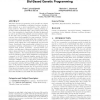Free Online Productivity Tools
i2Speak
i2Symbol
i2OCR
iTex2Img
iWeb2Print
iWeb2Shot
i2Type
iPdf2Split
iPdf2Merge
i2Bopomofo
i2Arabic
i2Style
i2Image
i2PDF
iLatex2Rtf
Sci2ools
114
click to vote
GECCO
2008
Springer
2008
Springer
Managing team-based problem solving with symbiotic bid-based genetic programming
Bid-based Genetic Programming (GP) provides an elegant mechanism for facilitating cooperative problem decomposition without an a priori specification of the number of team members. This is in contrast to existing teaming approaches where individuals learn a direct input-output map (e.g., from exemplars to class labels), allowing the approach to scale to problems with multiple outcomes (classes), while at the same time providing a mechanism for choosing an outcome from those suggested by team members. This paper proposes a symbiotic relationship that continues to support the cooperative bid-based process for problem decomposition while making the credit assignment process much clearer. Specifically, team membership is defined by a team population indexing combinations of GP individuals in a separate team member population. A Pareto-based competitive coevolutionary component enables the approach to scale to large problems by evolving informative test points in a third population. The...
| Added | 09 Nov 2010 |
| Updated | 09 Nov 2010 |
| Type | Conference |
| Year | 2008 |
| Where | GECCO |
| Authors | Peter Lichodzijewski, Malcolm I. Heywood |
Comments (0)

